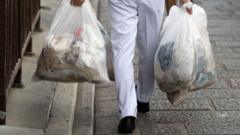Fukushima's strict new trash regulations, effective March, will authorize city officials to inspect refuse bags and disclose offenders’ identities. This initiative aims to enhance waste management and reduce the high non-compliance rate reported in 2022.
Fukushima Implements Stringent Trash Regulations to Curb Waste Mismanagement

Fukushima Implements Stringent Trash Regulations to Curb Waste Mismanagement
In an effort to improve compliance with waste disposal rules, Fukushima City will publicly identify individuals and businesses violating trash sorting regulations starting March.
Fukushima City is set to enforce a tough new garbage disposal policy requiring residents to sort their trash meticulously or face public identification. Under the proposed rules, which will come into effect in March, city workers will inspect waste bags that do not meet the sorting and size requirements. If trash is found unsorted for an entire week, authorities will sift through the contents—potentially utilizing personal items like mail to identify offenders.
This move marks a significant escalation in Japan's longstanding emphasis on waste management, a country known for its stringent recycling laws. In 2022, over 9,000 cases of garbage non-compliance were reported in Fukushima alone. Historically, the city's approach has simply involved notifying offenders with stickers on their bags. However, the new regulations will issue verbal warnings followed by written advisories, ultimately leading to public disclosure on the city’s official website for repeat offenders.
Concerns about privacy have been raised, yet city officials assure that trash inspections will remain confidential. The guidelines for waste disposal vary by locality in Japan. In Fukushima, for instance, residents must place their bags at designated spots by 8:30 AM without leaving them out overnight. Different types of refuse—combustibles, non-combustibles, and recyclables—are collected on specific schedules. Larger items, such as furniture, require prior appointments for collection.
Mayor Hiroshi Kohata emphasized that these new measures aim to foster waste reduction and adherence to proper disposal practices, asserting, "There is nothing illegal about publicizing malicious waste generators who do not abide by the rules." Japan's efforts since the 1990s to move away from landfills and promote recycling have led communities like Kamikatsu, which sorts waste into 45 categories, and initiatives like Chiba’s AI-based waste disposal assistant that guide residents in proper trash disposal methods.
This move marks a significant escalation in Japan's longstanding emphasis on waste management, a country known for its stringent recycling laws. In 2022, over 9,000 cases of garbage non-compliance were reported in Fukushima alone. Historically, the city's approach has simply involved notifying offenders with stickers on their bags. However, the new regulations will issue verbal warnings followed by written advisories, ultimately leading to public disclosure on the city’s official website for repeat offenders.
Concerns about privacy have been raised, yet city officials assure that trash inspections will remain confidential. The guidelines for waste disposal vary by locality in Japan. In Fukushima, for instance, residents must place their bags at designated spots by 8:30 AM without leaving them out overnight. Different types of refuse—combustibles, non-combustibles, and recyclables—are collected on specific schedules. Larger items, such as furniture, require prior appointments for collection.
Mayor Hiroshi Kohata emphasized that these new measures aim to foster waste reduction and adherence to proper disposal practices, asserting, "There is nothing illegal about publicizing malicious waste generators who do not abide by the rules." Japan's efforts since the 1990s to move away from landfills and promote recycling have led communities like Kamikatsu, which sorts waste into 45 categories, and initiatives like Chiba’s AI-based waste disposal assistant that guide residents in proper trash disposal methods.
















